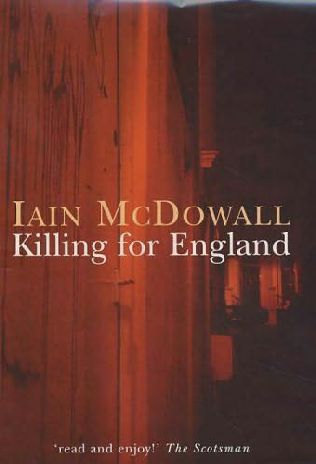
Killing for England
Iain McDowall
305 pages
published in 2005
I picked up this book because I thought it was by a writer I sort of knew, then kept looking when it became clear McDowall wasn't the writer I was thinking of, because the back cover blurbs compared him favourably to Ian Rankin. That intrigued me enough to read the first few pages and those few pages in turn hooked me and got me to take the book out of the library. For once, the blurb writers had done their work well, though the comparison to Rankin turned out to be only superficial.
Like Rankin, McDowall has a gritty, older detective as his hero, Chief Inspector Jacobson, somebody, again like Rankin's Rebus, who does not sit well with his police force's hierarchy. Like Rankin, McDowall has a good eye for the politics of policing as well. Where they differ is in the setting: Rebus polices gritty, urban Edinburgh, while Jacobson patrols fictional, small town English Crowby. Jacobson is also less cynical, less worldweary than Rebus, more idealistic perhaps. McDowall, on the strength of Killing for England at least, is no Rankin clone, but won't be a disappointment for those looking for a similar sort of writer.
When Jacobson had been on holiday leave over the New Year, a young Black man was fished out of the river Crow. The investigation, led by Jacobson's superior Greg Salter, whom Jacobson doesn't rate highly, returns a verdict of death by suicide. Nevertheless when Paul Shaw, a cousin of the deceased and an up and coming investigative reporter, comes to Crowby insisting that his cousin was murdered rather than committed suicide, he doesn't believe him or feel inclined to do some investigating himself. And then of course Shaw himself ends up drowned in the Crow as well. One such drowning could well be suicide, but two in a row, of people related to each other?
Of course not. Both Shaw and his cousin were murdered, as the reader knows almost immediately and Jacobson soon suspects. He and DS Kerr, his righthand man, have a hell of a time proving it though. McDowall does a good job in sketching the investigation process, in the best police procedural tradition, putting in just enough detail to keep you interested without overloading you too much with the technicalities of police investigations.
It soon turns out that the killings are pointing to something bigger, again something the reader knows earlier than Jacobson and Kerr. Because one of the narrative strands of the novel follows Rick Cole, a hardcore racist and right wing extremist. Cole is perhaps the most interesting character in Killing for England: a smart, intelligent self made man who doesn't fit the stereotype of the racist meathead at all, but who is wholly convinced of both the inevitability and the need for a race war in England. McDowall makes Cole believable and his internal reasoning believable.
Cole is part of the inner circle of a new rightwing party in England, if not part of its core leadership. This party wants to avoid making all the mistakes the BNP made, to only make its existence public when it's ready to fight elections, to keep discipline and order and avoid the obvious nutters the BNP attracts. More hardcore, smarter and more ruthless than the BNP, this party is still kept secret and having some noisy Black men snooping about might explain why they were murdered...
Killing for England was a quick read, the largest part of which I read in one morning. I liked the politics of it, leftwing without being preachy and while the plot wasn't too surprising, it kept chugging along nicely. A nice diversion.
Webpage created 27-01-2010, last updated 20-02-2011.